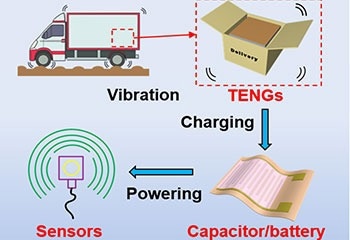Case Western Reserve University is leading the way in the development of a monitoring system designed to keep food shipments fresh, decrease waste, and enhance supply chain management.

Image Credit: Case Western Reserve University
Scientists from Case Western Reserve University are attempting to create a “smart packaging” system to track moisture changes, temperature fluctuations, and pathogens in perishable food products during transportation.
Their energy-efficient approach has the potential to offer a more cost-effective supply chain for distributors, saving food producers money and ensuring higher-quality food for consumers.
If this works well, everyone stands to benefit. About one-third of all food produced for human consumption gets lost or wasted—roughly 1.3 billion tons of food each year. Our solution could significantly reduce spoilage, cut costs, and ensure food safety.
Chanyong (Chase) Cao, Assistant Professor of Mechanical and Aerospace Engineering and Electrical, Computer and Systems Engineering, Case Western Reserve
The study performed by the research team was recently reported online in the journal Nano Energy.
Self-Powered Monitoring
One of the key features of the system is a small, self-powered monitoring device made up of flexible sensors and an energy harvester that uses desiccants — the small packets of silica gel pellets found in packaging to absorb moisture — for harnessing and storing ambient energy.
In this system, the energy is generated from the vibrations of the food delivery truck itself.
This energy powers a real-time monitoring system that would give food producers and transport staff access to digital data regarding the temperature, moisture and spoilage conditions of the packaged food.
To make this a reality, Cao and his team created a desiccant-based triboelectric nanogenerator (D-TENG) to extend the serving time of the sensing system.
Triboelectric nanogenerators are energy-harvesting devices that are able to transform mechanical energy into electricity.
The research group developed a paperboard-based honeycomb frame to store the desiccant materials — which is now also utilized to make electricity as they bounce around inside the honeycomb.
While some modern transport companies already use sensors to record temperature, humidity, and carbon dioxide, the traditional batteries required to operate those systems can be expensive, heavy, and significant contributors to environmental pollution.
Many of these more conventional systems are also unable to offer real-time data that can aid in the detection of food spoilage, Cao stated.
The systems currently in use are small, portable systems that are only capable of detecting environmental conditions within a very limited period.
Potential Reach, Next Steps
The team's efforts align well with the World Bank’s suggested solutions to food waste, which consists of better technology for storing and keeping perishables fresh in the supply chain.
While Cao and his team have yet to address the issue surrounding how to better cool perishable food in transit, they intend to identify when and what might go wrong in such scenarios.
The team is currently in the process of assembling a functioning prototype; Cao also hopes to be able to scale up production and marketing in the next five years.
Cao and his research group are concentrating on detecting and preventing food spoilage, but the team is hopeful that this technology will also be able to offer advantages when it comes to the shipment of vital vaccines, especially as the system can offer companies and government agencies precise real-time information regarding the temperature of those vital shipments.
Journal Reference:
Pang, Y., et al. (2023) Toward self-powered integrated smart packaging system − Desiccant-based triboelectric nanogenerators. Nano Energy. doi.org/10.1016/j.nanoen.2023.108659.
Source: https://case.edu/